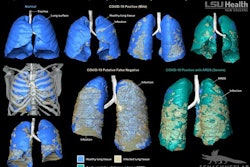Dear AuntMinnie Member,
It's no secret that subspecialization is a powerful trend in radiology -- are you ready? Find out in a free webinar we're hosting on Wednesday, October 14, at 1 p.m. Eastern Daylight Time.
We'll have a panel of radiology key opinion leaders who will be discussing the major issues in radiology subspecialization -- the forces driving the phenomenon, the clinical benefits of subspecialization, and how radiologists can adapt.
Registration is free, so be sure to join us on Wednesday!
Trump gets imaging
When President Donald Trump announced last week that he had contracted COVID-19, it immediately dominated the headlines. Political pundits of every stripe began scrutinizing the care he was receiving at Walter Reed National Military Medical Center.
Among the issues were the findings on the imaging studies that Trump received, both CT and x-ray, and whether there were signs of lung involvement on the exams -- an indication that the president's case could be more serious than has been revealed publicly.
In other CT news, researchers from Canada presented findings on the use of dual-energy CT (DECT) for emergency imaging. They found that additional information available on DECT could obviate the need for follow-up exams like MRI.
Another study found that coronary artery calcium scores from CT scans of patients being treated for breast cancer can predict the risk of cardiovascular disease. And Chinese researchers shared their findings of a prediction model that helped risk-stratify patients with moderate COVID-19.
Get these stories and more in our CT Community.
Image-guided biopsy
Finally, visit our Advanced Visualization Community for an article on how image-guided biopsy performed after patients with breast cancer received chemotherapy can predict which patients will have residual cancer -- and eliminate the need for surgery.



















